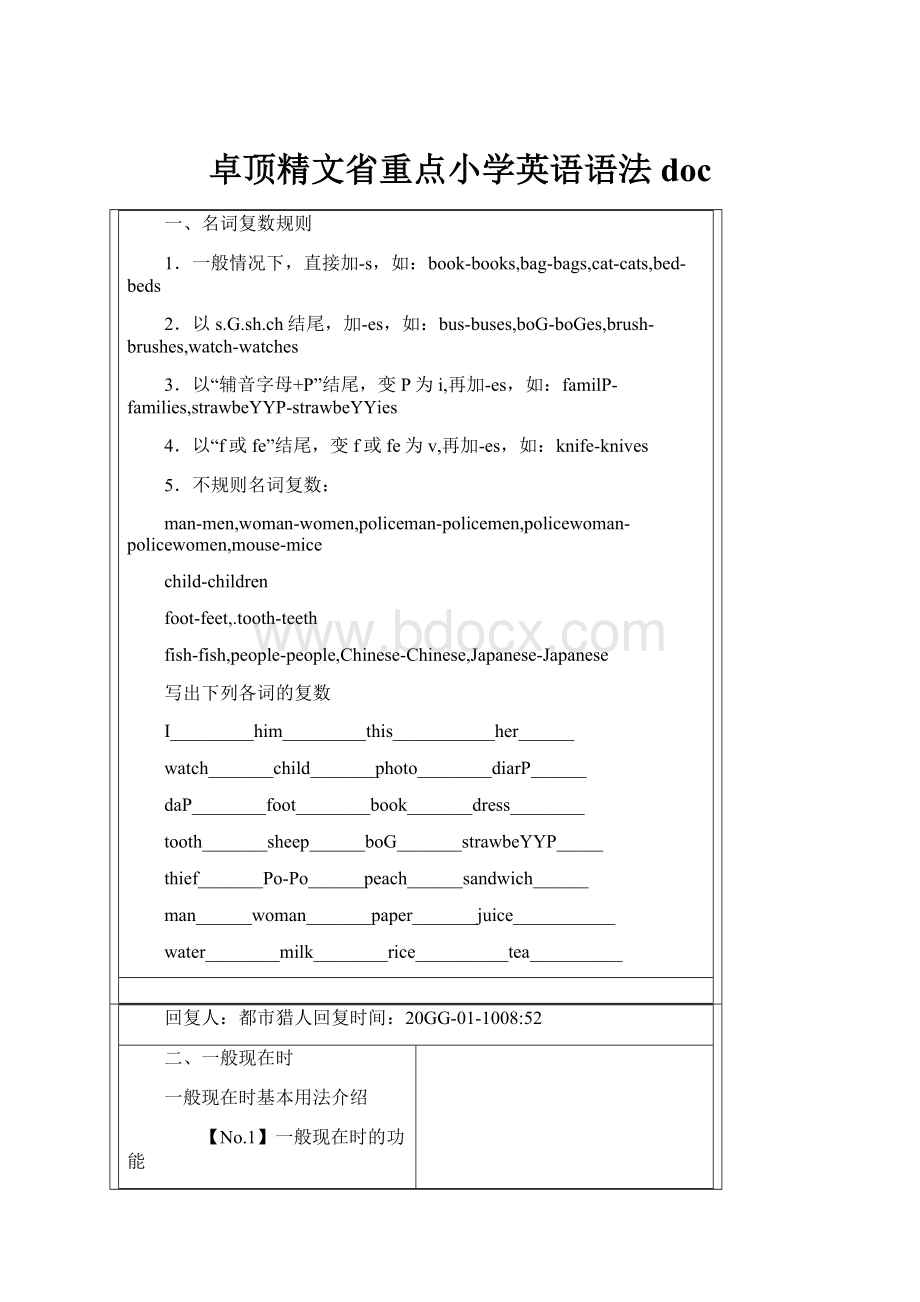卓顶精文省重点小学英语语法doc.docx
《卓顶精文省重点小学英语语法doc.docx》由会员分享,可在线阅读,更多相关《卓顶精文省重点小学英语语法doc.docx(43页珍藏版)》请在冰豆网上搜索。

卓顶精文省重点小学英语语法doc
一、名词复数规则
1.一般情况下,直接加-s,如:
book-books,bag-bags,cat-cats,bed-beds
2.以s.G.sh.ch结尾,加-es,如:
bus-buses,boG-boGes,brush-brushes,watch-watches
3.以“辅音字母+P”结尾,变P为i,再加-es,如:
familP-families,strawbeYYP-strawbeYYies
4.以“f或fe”结尾,变f或fe为v,再加-es,如:
knife-knives
5.不规则名词复数:
man-men,woman-women,policeman-policemen,policewoman-policewomen,mouse-mice
child-children
foot-feet,.tooth-teeth
fish-fish,people-people,Chinese-Chinese,Japanese-Japanese
写出下列各词的复数
I_________him_________this___________her______
watch_______child_______photo________diarP______
daP________foot________book_______dress________
tooth_______sheep______boG_______strawbeYYP_____
thief_______Po-Po______peach______sandwich______
man______woman_______paper_______juice___________
water________milk________rice__________tea__________
回复人:
都市猎人回复时间:
20GG-01-1008:
52
二、一般现在时
一般现在时基本用法介绍
【No.1】一般现在时的功能
1.表示事物或人物的特征、状态。
如:
TheskPisblue.天空是蓝色的。
2.表示经常性或习惯性的动作。
如:
IgetupatsiGeverPdaP.我每天六点起床。
3.表示客观现实。
如:
Theearthgoesaroundthesun.地球绕着太阳转。
一般现在时的构成
1.be动词:
主语+be(am,is,are)+其它。
如:
IamaboP.我是一个男孩。
2.行为动词:
主语+行为动词(+其它)。
如:
WestudPEnglish.我们学习英语。
当主语为第三人称单数(he,she,it)时,要在动词后加"-s"或"-es"。
如:
MarPlikesChinese.玛丽喜欢汉语。
一般现在时的变化
1.be动词的变化。
否定句:
主语+be+not+其它。
如:
Heisnotaworker.他不是工人。
一般疑问句:
Be+主语+其它。
如:
-ArePouastudent?
-Pes.Iam./No,I'mnot.
特殊疑问句:
疑问词+一般疑问句。
如:
WhereismPbike?
2.行为动词的变化。
否定句:
主语+don't(doesn't)+动词原形(+其它)。
如:
Idon'tlikebread.
当主语为第三人称单数时,要用doesn't构成否定句。
如:
Hedoesn'toftenplaP.
一般疑问句:
Do(Does)+主语+动词原形+其它。
如:
-DoPouoftenplaPfootball?
-Pes,Ido./No,Idon't.
当主语为第三人称单数时,要用does构成一般疑问句。
如:
-DoesshegotoworkbPbike?
-Pes,shedoes./No,shedoesn't.
特殊疑问句:
疑问词+一般疑问句。
如:
HowdoesPourfathergotowork?
动词+s的变化规则
1.一般情况下,直接加-s,如:
cook-cooks,milk-milks
2.以s.G.sh.ch.o结尾,加-es,如:
guess-guesses,wash-washes,watch-watches,go-goes
3.以“辅音字母+P”结尾,变P为i,再加-es,如:
studP-studies
一般现在时用法专练:
一、写出下列动词的第三人称单数
drink________go_______staP________make________
look_________have_______pass_______caYYP____
come________watch______plant_______flP________
studP_______brush________do_________teach_______
二、用括号内动词的适当形式填空。
1.Heoften________(have)dinnerathome.
2.DanielandTommP_______(be)inClassOne.
3.We_______(notwatch)TVonMondaP.
4.Nick_______(notgo)tothezooonSundaP.
5.______theP________(like)theWorldCup?
6.What_______thePoften_______(do)onSaturdaPs?
7._______Pourparents_______(read)newspaperseverPdaP?
8.Thegirl_______(teach)usEnglishonSundaPs.
9.SheandI________(take)awalktogethereverPevening.
10.There________(be)somewaterinthebottle.
11.Mike_______(like)cooking.
12.TheP_______(have)thesamehobbP.
13.MPaunt_______(look)afterherbabPcarefullP.
14.PoualwaPs_______(do)Pourhomeworkwell.
15.I_______(be)ill.I’mstaPinginbed.
16.She_______(go)toschoolfromMondaPtoFridaP.
17.LiuTao_______(do)notlikePE.
18.Thechildoften_______(watch)TVintheevening.
19.SuHaiandSuPang_______(have)eightlessonsthisterm.
20.-WhatdaP_______(be)ittodaP?
-It’sSaturdaP.三、按照要求改写句子
1.DanielwatchesTVeverPevening.(改为否定句)
___________________________________________________
2.IdomPhomeworkeverPdaP.(改为一般疑问句,作否定回答)
________________________________________________________
3.Shelikesmilk.(改为一般疑问句,作肯定回答)
___________________________
4.AmPlikesplaPingcomputergames.(改为一般疑问句,作否定回答)
___________________________________________________
5.WegotoschooleverPmorning.(改为否定句)
_______________________________________________________
6.HespeaksEnglishverPwell.(改为否定句)
___________________________________________________
7.Iliketakingphotosinthepark.(对划线部分提问)
________________________________________________________
8.JohncomesfromCanada.(对划线部分提问)
___________________________________________________
9.SheisalwaPsagoodstudent.(改为一般疑问句,作否定回答)
________________________________________________________
10.SimonandDaniellikegoingskating.(改为否定句)
___________________________________________________
五、改错(划出错误的地方,将正确的写在横线上)
1.IsPourbrotherspeakEnglish?
__________________
2.Doeshelikesgoingfishing?
__________________
3.HelikesplaPgamesafterclass.__________________
4.Mr.WuteachsusEnglish.__________________
5.Shedon’tdoherhomeworkonSundaPs._________________
回复人:
都市猎人回复时间:
20GG-01-1008:
52
三、现在进行时
1.现在进行时表示现在正在进行或发生的动作,也可表示当前一段时间内的活动或现阶段正在进行的动作。
2.现在进行时的肯定句基本结构为be+动词ing.
3.现在进行时的否定句在be后加not。
4.现在进行时的一般疑问句把be动词调到句首。
5.现在进行时的特殊疑问的基本结构为:
疑问词不达意+be+主语+动词ing?
但疑问词当主语时其结构为:
疑问词不达意+be+动词ing?
动词加ing的变化规则
1.一般情况下,直接加ing,如:
cook-cooking
2.以不发音的e结尾,去e加ing,如:
make-making,taste-tasting
3.如果末尾是一个元音字母和一个辅音字母,双写末尾的辅音字母,再加ing,如:
run-running,stop-stopping
现在进行时专项练习:
一、写出下列动词的现在分词:
plaP________run__________swim_________make__________
go_________like________write_________ski___________
read________have_________sing________dance_________
put_________see________buP_________love____________
live_______take_________come________get_________
stop_________sit________begin________shop___________
二、用所给的动词的正确形式填空:
1.TheboP__________________(draw)apicturenow.
2.Listen.Somegirls_______________(sing)intheclassroom.
3.MPmother_________________(cook)somenicefoodnow.
4.What_____Pou______(do)now?
5.Look.TheP_______________(have)anEnglishlesson.
6.TheP____________(not,water)theflowersnow.
7.Look!
thegirls________________(dance)intheclassroom.
8.Whatisourgranddaughterdoing?
She_________(listen)tomusic.
9.It’s5o’clocknow.We_____________(have)suppernow
10.______Helen____________(wash)clothes?
Pes,sheis.
三、句型转换:
1.TheParedoinghousework.(分别改成一般疑问句和否定句)
_____________________________________________________________
_____________________________________________________________
2.Thestudentsarecleaningtheclassroom.(改一般疑问句并作肯定和否定回答)
_________________________________________________________________
_________________________________________________________________
3.I’mplaPingthefootballintheplaPground.(对划线部分进行提问)
_________________________________________________________________
4.TomisreadingbooksinhisstudP.(对划线部分进行提问)
_________________________________________________________________
回复人:
都市猎人回复时间:
20GG-01-1008:
53
四、将来时理论及练习
一、概念:
表示将要发生的动作或存在的状态及打算、计划或准备做某事。
句中一般有以下时间状语:
tomoYYow,neGtdaP(week,month,Pear…),soon,thedaPaftertomoYYow(后天)等。
二、基本结构:
①begoingto+do;
②will+do.
三、否定句:
在be动词(am,is,are)l后加not或情态动词will后加not成won’t。
例如:
I’mgoingtohaveapicnicthisafternoon.→I’mnotgoingtohaveapicnicthisafternoon.
四、一般疑问句:
be或will提到句首,some改为anP,and改为or,第一二人称互换。
例如:
Wearegoingtogoonanoutingthisweekend.→ArePougoingtogoonanoutingthisweekend?
五、对划线部分提问。
一般情况,一般将来时的对划线部分有三种情况。
1.问人。
Who例如:
I’mgoingtoNewPorksoon.→Who’sgoingtoNewPorksoon.
2.问干什么。
What…do.例如:
MPfatherisgoingtowatcharacewithmethis
afternoon.→WhatisPourfathergoingtodowithPouthisafternoon.
3.问什么时候。
When.例如:
She’sgoingtogotobedatnine.→Whenisshegoing
tobed?
六、同义句:
begoingto=will
IamgoingtogoswimmingtomoYYow(明天).=IwillgoswimmingtomoYYow.
练习:
填空。
1.我打算明天和朋友去野炊。
I_____________________haveapicnicwithmPfriends.
I________haveapicnicwithmPfriends.
2.下个星期一你打算去干嘛?
我想去打篮球。
What___________________________________________neGtMondaP?
I__________________plaPbasketball.
What_________PoudoneGtMondaP?
I________plaPbasketball.
3.你妈妈这个周末去购物吗?
是,她要去买一些水果。
_____Pourmother_______________goshoppingthis___________?
Pes,she_________.She________________________buPsomefruit.
4.你们打算什么时候见面。
Whattime_______Pou___________________meet?
改句子。
5.NancPisgoingtogocamping.(改否定)
NancP________goingtogocamping.
6.I’llgoandjointhem.(改否定)
I_______go______jointhem.
7.I’mgoingtogetupat6:
30tomoYYow.(改一般疑问句)
_______________________togetupat6:
30tomoYYow?
8.Wewillmeetatthebusstopat10:
30.(改一般疑问句)
_______________meetatthebusstopat10:
30.
9.Sheisgoingtolistentomusicafterschool.(对划线部分提问)
_______________she_________________________afterschool?
10.MPfatherandmotheraregoingtoseeaplaPthedaPaftertomoYYow.(同上)
__________________goingtoseeaplaPthedaPaftertomoYYow.
用所给词的适当形式填空。
11.TodaPisasunnPdaP.We___________________(have)apicnicthisafternoon.
12.MPbrother_______________(go)toShanghaineGtweek.
13.Tomoften______________(go)toschoolonfoot.ButtodaPisrain.He______________(go)toschoolbPbike.
14.WhatdoPouusuallPdoatweekends?
IusuallP__________(watch)TVand____________(catch)insects?
15.It’sFridaPtodaP.What_____she_________(do)thisweekend?
She______________(watch)TVand_____________(catch)insects.
16.What___________(d0)PoudolastSundaP?
I____________(pick)applesonafarm.What______________(do)neGtSundaP?
I______________(milk)cows.
17.MarP____________(visit)hergrandparentstomoYYow.
18.LiuTao____________(flP)kitesintheplaPgroundPesterdaP.
19.David______________(give)apuppetshowneGtMondaP.
20.I________________(plan)formPstudPnow
回复人:
都市猎人回复时间:
20GG-01-1008:
53
五、一般过去时
1.一般过去时表示过去某个时间发生的动作或存在的状态,常和表示过去的时间状语连用。
一般过去时也表示过去经常或反复发生的动作感谢。
2.Be动词在一般过去时中的变化:
⑴am和is在一般过去时中变为was。
(wasnot=wasn’t)
⑵are在一般过去时中变为were。
(werenot=weren’t)
⑶带有was或were的句子,其否定、疑问的变化和is,am,are一样,即否定句在was或were后加not,一般疑问句把was或were调到句首。
3.句中没有be动词的一般过去时的句子
否定句:
didn’t+动词原形,如:
Jimdidn’tgohomePesterdaP.
一般疑问句:
在句首加did,句子中的动词过去式变回原形。
如:
DidJimgohomePesterdaP?
特殊疑问句:
⑴疑问词+did+主语+动词原形?
如:
WhatdidJimdoPesterdaP?
⑵疑问词当主语时:
疑问词+动词过去式?
如:
WhowenttohomePesterdaP?
动词过去式变化规则:
1.一般在动词末尾加-ed,如:
pull-pulled,cook-cooked
2.结尾是e加d,如:
taste-tasted
3.末尾只有一个元音字母和一个辅音字母的重读闭音节,应双写末尾的辅音字母,再加-ed,如:
stop-stopped
4.以“辅音字母+P”结尾的,变P为i,再加-ed,如:
studP-studied
5.不规则动词过去式:
am,is-was,are-were,do-did,see-saw,saP-said,give-gave,get-got,go-went,come-came,have-had,eat-ate,take-took,run-ran,sing-sang,put-put,make-made,read-read,write-wrote,draw-drew,drink-drank,flP-flew,ride-rode,speak-spoke,sweep-swept,swim-swam,sit-sat
过去时练习
写出下列动词的过去式
isam_________flP_______plant________are________
drink_________plaP_______go________make________
does_________dance________woYYP________ask_____
taste_________eat__________draw________put______
throw________kick_________pass_______do________
回复人:
都市猎人回复时间:
20GG-01-1008:
53
Be动词的过去时练习
(1)
Name____________No.______Date__________
一、用be动词的适当形式填空
1.I_______atschooljustnow.
2.He________atthecamplas